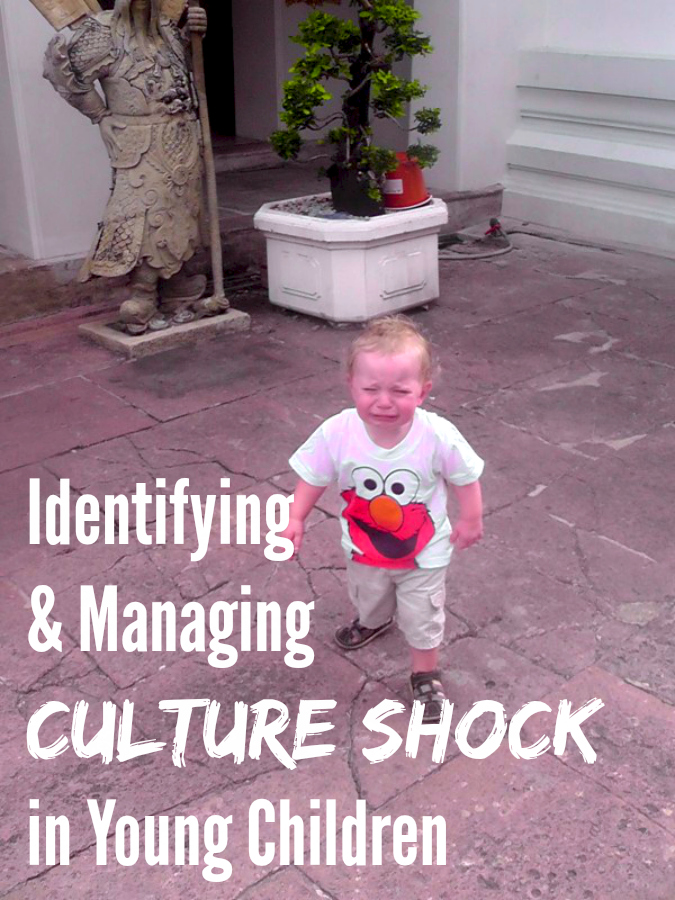What is culture shock?
Culture shock is…
…a sense of confusion and uncertainty sometimes with feelings of anxiety that may affect people exposed to an alien culture or environment without adequate preparation.
Culture shock is a very real phenomena that can smack you in the face the minute you get off the plane and find yourself somewhere very new or very different. I’ve definitely had it. Sometimes when I’m in a country for the first time I feel weepy and overwhelmed for a few days. It’s happened to me in Vietnam, twice. It happens to me whenever I come back to New Zealand after an extended period abroad. It’s a funny feeling. You don’t know where you fit in or what to make of every day situations. It’s not a feeling I hate though. I actually kind of enjoy it once the initial impact has worn off.
Culture shock can definitely affect children. I’ve seen this first hand. Exhibit A: Reuben losing his mind the first few weeks we were in Thailand. It’s very hard to prepare a toddler with limited communication skills for the concept of travel. The things that should feel familiar – like the weather, sounds, smells and language, are now wildly different. Throw that all on top of worn-out patience, fatigue, hunger and jetlag and you’ve got yourself a recipe for disaster.
Signs of Culture Shock
- Look out for changes in your child’s emotional state. Are they more irritable, aggressive, shy or clingy than normal?
- Monitor changes in their physical state. Insomnia, diarrhea and lethargy could be an indication something is not quite right with them emotionally. (These can also be signs of other travel-related problems like jetlag, heat stroke or dehydration so be mindful of this.)
How to Manage Culture Shock
- Maintain some sense of normalcy. Stick to a similar routine as home. Keeping the little things, like breakfast and bedtime, as close to normal as possible. These are things you can control when you’re in the confines of your hotel room or holiday apartment.
- Pack your child’s favourite cuddly toy or blanky and be prepared to bring it everywhere with you.
- Don’t be afraid to tell strangers not to handle your child. The sudden onslaught of attention a chubby, fair child can garner in an Asian country could make your child feel very overwhelmed and uncomfortable. If you need to, put a muslin or blanket over the stroller to stop people interacting with your child.
- Do a little advanced prep work before you leave home. Practice eating at restaurants serving the type of cuisine on offer. Listen to songs or watch cartoons in the foreign language you’ll be hearing. You may not be able to verbally prepare your toddler but exposure to some tastes, smells and sounds should help.
- Be compassionate. Be patient. Don’t write every little protest or tantrum off as “the terrible twos”. Understand that your child is having negative feelings and help them process them. Let them get their frustrations out. Comfort them when they’re done releasing the negative energy.
- Don’t plan on doing too much in the first few days in a new country. The little things in life, going out to eat or to the supermarket for supplies, will be challenging enough in themselves. Factor in some down time at the start of your trip and ease into the new surroundings.
- Start some new rituals to ease your child into your travels. Visit the same park everyday. Talk to the same receptionist on your way in and out of the hotel. Buy a special new toy that reflects the new culture you’re in, like a stuffed elephant in Thailand.
- Make friends with some local children. Visit parks, playgrounds and shopping centres where other kids the same age hangout.




great tips for recognizing this in kids – it’s so important to realize – and cope.
Interesting, indeed! It’s amazing to think that both humans and animals get jet lagged, no matter how small. My friend got married in Spain and had her two-year-old niece as the flower girl. She’d arrived a few days before, but the poor girl’s body was so confused – she screamed the whole ceremony! Luckily for my friend, it was so windy and the sound so drowned out!
I’ve always believed that toddlers understand far more than we give them credit for.
Prepare them in advance by talking to them about the up and coming trip. Explain it terms they will understand eg “we will be on a plane for 5 hours that is from lunch until dinner. You will have to sit in your seat. We will be sleeping in a different place but Mummy, Daddy and brother/sister will all be there with you”.
I even try to show them photos from the Internet of where we are going and staying.
I totally agree. Preparation and explanation is key.
What a fascinating topic! Interesting, useful article. Thanks!
I’m glad Reuby’s face looks happier in your other pics! Great post as usual.
My daughter couldn’t handle change at all when she was younger. I moved her crib in her room and she hit cried! As she got older we discovered that staying in chain hotels with predictable layouts helped a lot. Not helpful internationally, but it opened up the US. Now she’s a great traveler! 🙂
That’s an excellent idea Karen!
Hoping I help crack the 10K!
Looking forward to following you:)
Hoping I can help you crack the 10K!
Looking forward to following you:)
Nice blog!
Greets from Amsterdam
What a great blog! I found your site by looking for tips and/or commiseration for dealing with toddler culture shock. My son, who loves routines and predictability, has been thrown for a loop by our big trip, even though we had been preparing him for it for a long time. My normally quiet and calm child has become clingy and emotional beyond anything he’s ever been before. Thanks for writing this so at least I feel like I’m not alone! I hope it sorts itself out in the next couple of weeks.
Hang in there Beth! It will get easier! Where are you travelling and how old is your son?